Table of Contents
This is my Performance Lab® Vision review. This is by far the best vision supplement I’ve ever used. And I’m excited to tell you about it and my experience with this supplement.
Most of us haven’t put much thought into how vision impacts our daily life until something goes wrong.
Good eyesight is required for driving, watching TV or movies, reading, work, and participation in sports.
Even the simplest things like finding stuff in the fridge to make dinner. Or getting ready in the morning. Just looking up a phone number.
We devote most of our time and energy at Nootropics Expert® optimizing our brain. But to take advantage of an optimized brain we need healthy eyes.
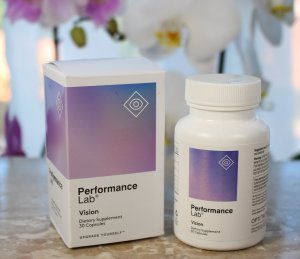 One of my main functions during the day is writing. All day spent with eyes glued to a large monitor. At least an hour out in the south Florida sun. And several hours reading on a tablet in the evening. Or watching a little TV.
One of my main functions during the day is writing. All day spent with eyes glued to a large monitor. At least an hour out in the south Florida sun. And several hours reading on a tablet in the evening. Or watching a little TV.
But I never suffer from eye fatigue. Nor do I worry about developing age-related macular degeneration, cataracts, or glaucoma later in life.
One of the ways I take care of my eyes is with a supplement called Click for Performance Lab® Vision .
In this review I’ll reveal my criteria for selecting a quality vision supplement. How and why this Vision formula works so well. And how it compares to other vision supplements on the market.
My Vision Supplement Criteria
Here’s what I want a vision formula to do for my eyes:
- Improve glare tolerance – to headlights, sunshine, or any bright light
- Boost focusing speed and motion detection
- Faster reaction-time – eye-hand and eye-body coordination
- Better low-light vision – able to see in dark and low-light conditions
- Clearer, crisper vision
- Relieve eye fatigue and straining
- Eye protection – from macular degeneration, glaucoma, and cataracts
Discovering Performance Lab®
If you’ve ever shopped for a vision supplement, you know that lutein is considered the “ultimate eye vitamin”.
But our eyes need a lot more support than just lutein. So some supplement companies include zeaxanthin and throw in an extra antioxidant like lycopene.
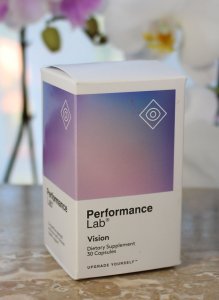 And a couple of the more popular vision supplements provide dozens of other vitamins and minerals which I already have in my daily multivitamin. So I can’t take them without worrying about vitamin and mineral toxicity.
And a couple of the more popular vision supplements provide dozens of other vitamins and minerals which I already have in my daily multivitamin. So I can’t take them without worrying about vitamin and mineral toxicity.
No supplement company that I’m aware of offers anything specifically for night vision, eye fatigue, or real protection from the daily strain put on our eyes.
I’ve found in researching the best supplements for vison and eye health that lycopene is one of the ‘older’ antioxidants promoted in this category. But recent science has revealed more potent antioxidants that cross into and are used in the eye better than lycopene.
So I’ve been on the lookout for a vision supplement that uses ingredients proven in the latest clinical trials to optimize all aspects of eye and vision health.
Recently I came across Performance Lab® and their new line of supplements. Including a supplement stack for vision based on the most recent science.
Who Makes Performance Lab?
Performance Lab® is a line of supplements and sister company to Click for Mind Lab Pro®
I’ve been using Mind Lab Pro® every day for over 5 years and have come to trust the company. And the quality of their supplements.
Performance Lab® is based in the U.K. and manufacturers all their supplements in the USA.
The company’s multivitamin for men and women supplies the essential vitamins and minerals required for overall body health including vision.
Performance Lab® Vision extends the benefits of their NutriGenesis® Multi specifically to enhance eye and vision health.
Performance Lab® Vision Ingredients
Before we dig into the ingredients in this vision supplement, it helps to understand how our eyes work. Then we’ll know what we need in the way of supplements to support each aspect of vision health.
How Your Eyes Work
Open your eyes and look around. Whatever appears in your field of vision enters your eyes as light rays (photons). Photons enter your eye through the cornea which is the clear “window” covering the front of your eye. It bends the rays, so they can pass freely through the pupil.
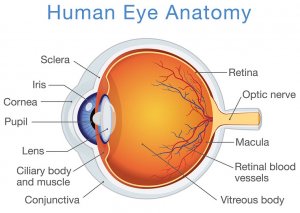 The iris, or colored part of your eye, controls the size of the pupil just like the aperture in a camera. Adjusting the amount of light entering your eye.
The iris, or colored part of your eye, controls the size of the pupil just like the aperture in a camera. Adjusting the amount of light entering your eye.
After passing through the iris, light rays pass through the eye’s natural crystalline lens. Which controls the focus just like a camera lens.
Light rays continue through a dense, transparent gel-like substance through to the retina at the back of the eye.
The retina functions like a camera film, or the sensor in a digital camera. Photoreceptor cells on the retina, known as cones and rods, convert incoming photons (light rays) to electrical signals.
Cones are responsible for red, green, and blue color perception. And rods are responsible for low light vision.
These photoreceptors consist of opsin (a protein) and retinal (a lipid). Retinal is one of the many forms of Vitamin A which comes from carotenoids like β-carotene in your diet.
These signals enter the optic nerve in your brain where special ‘vision centers’ in your brain process them into images.
The macula at the center of the retina is responsible for high resolution, color vision. Its yellow color absorbs excess blue and ultraviolet light acting as natural “sunglasses” in this area of the retina.[i]
The yellow color of the macula comes naturally from lutein and zeaxanthin, which are carotenoids from your diet or a supplement like Performance Lab® Vision.
Below are how each of the ingredients in Performance Lab® Vision work to repair and optimize vision.
Lutein + Zeaxanthin
Lutein 10 mg + Zeaxanthin 2 mg (FloraGLO®)
The yellow carotenoids lutein and zeaxanthin are used throughout your body. But the macula and fovea sections of the retina in your eyes have the highest concentrations.
Lutein and zeaxanthin help protect the macula from high-energy radiation (blue light). They help filter out blue light before it can damage the macula.[ii]
And lutein and zeaxanthin are potent antioxidants. Reactive oxygen species (ROS) are naturally produced during the conversion of photons to electrical signals in photoceptors in your retina.[iii]
But low dietary intake of these carotenoids, and lower macular pigment densities of these nutrients because of age, put your eyes at risk of age-related macular degeneration (AMD).[iv] And cataracts.[v] Caused in part by damage from out-of-control ROS.
Researchers at Xi’an Jiaotong University College of Medicine in China evaluated clinical studies in 4 medical databases. To evaluate the effects of lutein and zeaxanthin supplementation in AMD patients.
A total of eight trials involving 1,176 AMD patients were included in this analysis. The team concluded that lutein and zeaxanthin were a safe strategy for improving visual performance with AMD patients.[vi]
Studies have shown that supplementing with lutein and zeaxanthin in the initial stages of AMD helps reduce symptoms.[vii] And may help prevent AMD if supplemented early enough.[viii]
Turns out that supplementing with lutein and zeaxanthin can help improve vision in low light conditions too.
A team at City University in London had 34 healthy young people supplement with lutein and zeaxanthin for a year. And results suggested that lutein and zeaxanthin did indeed enhance visual performance in low light conditions.[ix]
Now this is where it gets really interesting. And applies to everyone reading this review.
Supplementing with lutein 10 mg and zeaxanthin 2 mg in healthy subjects provides clear, high-resolution vision and the ability to see shapes and fine detail from a distance.
It improves glare recovery, making it easier and safer to drive at night. Or when you shift your eyes away from a digital display or walk from a highly-lit room into a darker space.
And this combination of nutrients helps you distinguish subtle changes of light and dark. Enabling you to see and track motion against difficult backdrops like low light or fog.
Subjects in one study using lutein and zeaxanthin for a year were able to see one more line down on a Snellen chart. The kind of chart the optometrist uses to check your vision in his office.[x]
The patented FloraGLO® used in Performance Lab® Vision are natural forms of lutein and zeaxanthin made from non-GMO marigold flowers.
Backed by 20 years of research and over 80 human clinical trials, FloraGLO is supported by a patent showing how lutein filters blue light. And is even safe for babies.
Your body cannot produce lutein or zeaxanthin on its own. To get 10 mg of lutein you would need to eat 3 cups of raw spinach or 2 pounds of broccoli every day.
Or you can take 1 capsule of Click for Performance Lab® Vision
European Black Currant
European Black Currant extract 25 mg
(standardized for min. 25% Anthocyanins, typically supplying 2.2% C3G) + 300 mg freeze-dried powder
Rhodopsin is a light-sensitive protein found in the rods of the retina in your eyes. It is extremely sensitive to light and allows you to see in low-light conditions like driving at night.
When a molecule of rhodopsin absorbs a photon, it splits into a retinal molecule (11-trans-retinal) and an opsin molecule. This process initiates a biochemical reaction that sends a signal to your brain’s visual processing center.[xi] So you can make images out in the dark.
Retinal and opsin then recombine into rhodopsin.
Even though the initial splitting of rhodopsin into retinal and opsin is nearly instantaneous, it can take up to 30 minutes for opsin and retinal to recombine and restore rhodopsin to optimal levels.[xii]
Aging is directly associated with a reduction in the ability of rhodopsin to regenerate, resulting in a progressive deterioration of night vision.[xiii]
A purple plant pigment in Black Currant called C3G (Cyanidin-3-glucoside) helps regenerate rhodopsin.[xiv] Allowing for quicker dark vision recovery.
Black Currant is quickly growing in popularity as a vision performance enhancer among athletes and the competitive gaming community.
 Verified in a Japanese study with 12 healthy adults, researchers found that supplementing with Black Currant reduced the dark adaptation threshold. And improved recovery time and reduced fatigue when working at a computer screen.[xv]
Verified in a Japanese study with 12 healthy adults, researchers found that supplementing with Black Currant reduced the dark adaptation threshold. And improved recovery time and reduced fatigue when working at a computer screen.[xv]
Black Currant is also a potent antioxidant. Critical for the high-energy environment of the retina where continuously flowing electrons and photons produce damaging free radical surges.[xvi]
Studies show that the anthocyanins in Black Currant reduce inflammation by inhibiting protein and DNA synthesis of mycotoxins.[xvii]
And Black Current boosts vision by increasing blood flow to and within the eye by upregulating nitric oxide synthase. Increasing nitric oxide which helps blood vessels move more blood.[xviii]
Performance Lab® Vision uses a Black Currant extract standardized for a minimum of 25% anthocyanins.
And 300 mg of Black Currant powder supplies even more C3G and the full spectrum of antioxidant compounds found in the Black Currant berry.
European Bilberry
European Bilberry extract 25 mg
(standardized for min. 25% anthocyanosides)
Bilberry is one of the richest sources of anthocyanins. In the same berry family as American blueberries, Bilberry has a long history of use for eye disorders and promoting vision.
Several studies have shown the effects of Bilberry on treating cataracts, retinopathy (disease of the retina), age-related macular degeneration (AMD), and night vision.
Studies in human subjects show Bilberry effective in improving problems with the retina, improving small blood vessel (capillary) integrity which boosts blood flow, and slowing the progression of issues with lens opacity and myopia (nearsightedness).
And like Black Current, Bilberry provides C3G which helps regenerate rhodopsin, improving night vision.[xix]
Bilberry is also loaded with at least 15 different anthocyanin antioxidants. Along with Vitamin C, quercetin, and resveratrol.
Bilberry extract has been shown to protect the retina from free radical damage. And helps tame inflammation in the eye.
You’re aware of all the evils associated with blue light emitted by LCD’s, digital screens, and other light sources. And its contribution to AMD.
The good news is Bilberry extract helps protect against blue light-emitting diode (LED) light-induced photoreceptor cell damage.[xx]
Bilberry’s popularity as a vision enhancer continues to grow. And because this supplement is so highly valued, it’s difficult to distinguish counterfeit bilberry supplements with a genuine Bilberry extract.
A 2014 study conducted in Milan found 50% of the Bilberry extracts tested were not Bilberry. And 60% had a lower anthocyanin content than declared on the label.[xxi]
Opti Nutra® tests and retests the Bilberry Extract used in Performance Lab® Vision to guarantee it supplies a minimum of 25% anthocyanosides in every bottle.
Saffron
Saffron 1 mg (standardized for min. 0.3% safranal)
Saffron, the world’s most expensive culinary spice comes from the crocus flower (Crocus sativus).
Newly published studies demonstrate Saffron’s ability to improve vision sharpness and improve light flicker sensitivity. Saffron also reduces damage to photoreceptor cells and helps prevent macular degeneration (AMD).
In fact, AMD patients supplementing with Saffron for 12 months improved so much they were able to see two additional lines on the Snellen chart.[xxii]
Saffron extract is used in Performance Lab® Vision because of its potent antioxidant properties. Crocin and picrocrocin are the major compounds in saffron. Crocin and α-carotene are responsible for its characteristic color, and picrocrocin is a precursor of safranal.[xxiii]
Ultraviolet blue light radiation (UV-B) can damage your eyes. Eventually leading to cataracts and age-related macular degeneration (AMD). The carotenoid α-crocin provided by Saffron protects retinal cells from UV-B damage.[xxiv]
Crocin also boosts blood flow in the retina and choroid of your eyes. The choroid layer is between the sclera (white of your eye) and the rest of the retina. Saffron improves the oxygen and nutrient supply required for healthy eyes.[xxv]
And several compounds found in Saffron extract provide potent antioxidant and free radical scavenger defense against reactive oxygen species (ROS) and pro-inflammatory cytokines.[xxvi]
Saffron extract has become popular within the athletic world because it helps improve vision. And reduces light flicker sensitivity from bright and flashing lights.
Performance Lab® Vision uses a patented form of saffron which provides a pure, safe, and effective extract.
It supplies Saffron’s full-spectrum antioxidant complex, including safranal and crocin, standardized to supply a minimum of 0.3% safranal.
Astaxanthin
Astaxanthin 1 mg (from haematococcus pluvialis algae extract)
 Astaxanthin is a natural pink xanthophyll found in only two places in nature; the microalgae that produce it, and the salmon, shellfish, krill, and birds that eat it (i.e. pink flamingos).
Astaxanthin is a natural pink xanthophyll found in only two places in nature; the microalgae that produce it, and the salmon, shellfish, krill, and birds that eat it (i.e. pink flamingos).
Astaxanthin has been shown in several clinical studies to be the most powerful antioxidant found in nature. And is a far more potent free radical scavenger than β-carotene and α-tocopherol.[xxvii]
It crosses the blood-brain barrier and the blood-retinal barrier while other antioxidants like β-carotene and lycopene do not.
Astaxanthin reduces oxidative damage caused by UV light. Preventing retinal damage and preventing cataract formation.
It also inhibits several inflammatory molecules including nuclear factor-kappaB (NF-kB) in the eye.[xxviii]
Human studies show supplementing with Astaxanthin reduces eye fatigue caused by staring at a digital screen all day. And improves the ability to change focus at different distances.[xxix]
Astaxanthin reduces blurred vision, dryness, and sore eyes. It reduces eye fatigue in healthy people. It improves retinal capillary blood flow and helps your eyes focus more easily. Astaxanthin improves depth perception and reduces ocular inflammation.[xxx]
Performance Lab® Vision uses astaxanthin from the richest source available of this natural antioxidant – Haematococcus pluvialis algae. Grown organically in a tightly controlled facility ensures purity.
NutriCaps® capsules
The capsules used in Performance Lab® Vision are so unique I had to include them the list of ingredients. And here’s why …
The premium ingredients used in Vision will only provide the benefit promised if your eyes can use them. How the ingredients get into our body and eyes matters a great deal.
Every other pre-formulated vision supplement on the market use either gelatin capsules, or vegetarian capsules.
Gelatin capsules are made by boiling down animal hoofs, bones, and connective tissue to form a gel-like substance. This material cools and dries. Then is formed into capsules.
Vegetarian capsules are Hydroxypropyl methylcellulose which are made from pine or poplar tree pulp. The end result is a type of plastic.
Performance Lab uses NutriCaps® which are made from pullulan (fermented tapioca). A much costlier way to encapsulate their supplements. But safer, vegan-friendly, and disintegrates right away once you take it.
And Performance Lab® infuses each capsule with a prebiotic that helps support your digestion. And helps make the ingredients in Vision more bioavailable.
I’m not aware of any other quality supplement manufacturer who goes the extra mile by using NutriCaps®.
Performance Lab® Vision Dosage
The amount for each ingredient listed on the label is for Performance Lab’s recommended 1-capsule per day.
You can safely double this dose to two capsules for extra protection and vision enhancement. One in the morning and another mid-day.
You’ll experience the best results by using Performance Lab® Vision with a multivitamin/mineral supplement.
And note that both lutein and zeaxanthin are fat-soluble ingredients in this stack. So for best results Vision should be taken with a healthy fat such as a tablespoon of unrefined coconut oil, or extra virgin olive oil. My preferred healthy fat is the new organic, non-GMO Click for Performance Lab® MCT Energy Oil
How Performance Lab® Vision Works in Real Life
I’ve been using Performance Lab® Vision for at least 8 years and am amazed at the difference in my vision. It first hit me in the evening of the very first day using this supplement.
I was outside in our backyard and it was somewhat startling that everything was in high-definition.
And as I mentioned earlier in this review, I spend all day writing using a large monitor. Then reading a book for a few hours in the evening on my tablet.
I have not experienced any eye fatigue or strain since I started using this supplement.
One of the problems not often discussed by those of us with ADD or ADHD is intolerance to glare. Bright lights bother us to the point of needing to wear sunglasses.
I’ve noticed my tolerance to sudden bright lights and glare has markedly improved since supplementing with Performance Lab® Vision.
Performance Lab® Vision is Good Value
Every major supplement manufacturer offers something for vision. Prices range from $10 – $50.
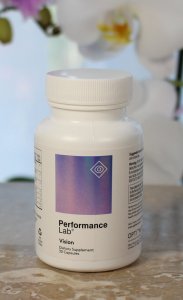 Some of the higher quality vision supplements include vitamins and minerals like Vitamin A, zinc, and copper. These nutrients are required for vision and eye health.
Some of the higher quality vision supplements include vitamins and minerals like Vitamin A, zinc, and copper. These nutrients are required for vision and eye health.
But it excludes that type of vision formula from our shopping list because we already have these nutrients in our multivitamin.
You can also find a vision supplement containing Black Currant extract or Bilberry extract – but not both.
And most manufacturers include lycopene as an antioxidant in their eye formula. The problem is there is very little evidence that lycopene can even cross the blood-retinal barrier into the eye.
The astaxanthin used in Performance Lab Vision has been proven to cross the blood-retinal barrier. And is the most potent antioxidant found in nature.
This ingredient alone puts this Vision formula in an exclusive category of supplements only offered by Performance Lab®.
You may be able to cobble together the ingredients in the Performance Lab Vision supplement as separate supplements. But your cost will be much higher than the $49 Performance Lab® asks for this premium vision formula.
An even better deal is one box FREE when you order 3-boxes including FREE shipping of Click for Performance Lab® Vision
Pros & Cons of Performance Lab® Vision
Performance Lab® have put together a unique combination of premium ingredients in this vision formula.
I couldn’t find another like it on the market. The science-backed nutrients offered in this vision formula, and the way they work in synergy is genius. And it works.
Here’s what I think are the pros and cons of this premium vision supplement.
Pros
- Full disclosure on the amount of each ingredient
- Highest quality, patented ingredients like FloraGLO®
- No added ingredients
- Prebiotic infused vegan-friendly NutriCaps® capsules
- No World Anti-Doping Agency (WADA) banned substances
- Vegan-friendly ingredients
- Tested prior to encapsulation for allergens, GMOs, microbes, pesticides, herbicides, heavy metals, and other contaminants
- Tested again to confirm potency, purity, and activity after encapsulation
- Ships in recyclable cardboard security boxes filled with biodegradable packing peanuts
- Competitively priced
- Empty bottle, money-back guarantee (less shipping)
- 24/7 customer support
Cons
- Only available on their website
I honestly can’t think of any other cons for this vision supplement. It works for me and I truly hope it works as well for you.
Nootropics Expert Recommendation
 I recommend the use of Performance Lab® Vision as a vision and eye supplement.
I recommend the use of Performance Lab® Vision as a vision and eye supplement.
Pricing of Performance Lab® Vision is competitive for what you get. Buying these supplements separately can cost much more. And honestly doesn’t make much sense to purchase individually.
The biggest advantage of this vison formula is the way it’s put together with premium ingredients.
This vision stack does exactly what a vision supplement should do – improves glare tolerance, boosts focusing speed, and decreases coordinated reaction-time.
Performance Lab® Vision also helps you see in low-light conditions, provides higher resolution vision, reduces eye strain and fatigue, and protects your eyes from age-related vision diseases.
This is by far the best eye and vision supplement on the market today.
Performance Lab® only offers their Performance Lab® products including their Vision formula on their website. You will not find it on Amazon or other online retailers.
Not only is this vision formula well-thought-out, but the company only uses the highest quality ingredients available. Including prebiotic-infused NutriCaps® capsules, and FloraGLO® lutein and zeaxanthin.
Testing is done before and after encapsulation to ensure quality and purity. And Performance Lab® offers a risk-free, “empty bottle”, money-back guarantee if you are not happy with this product.
And keep in mind that both lutein and zeaxanthin are fat-soluble ingredients in this stack. So for best results Vision should be taken with a healthy fat such as a tablespoon of unrefined coconut oil, or extra virgin olive oil. My preferred healthy fat is the new organic, non-GMO Click for Performance Lab® MCT Energy Oil .
So if you want to give your vision a boost – I recommend giving Performance Lab® Vision a try.
If you’d like to try Performance Lab® Vision, or learn more about this exceptional line of supplements, please go explore their website. And while you’re there, Click for Performance Lab® Vision


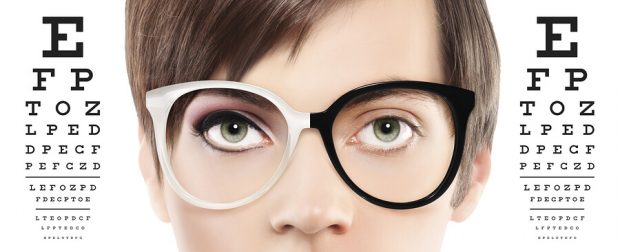
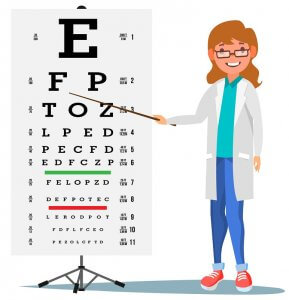





Join The Discussion - 26 comments
m
February 25, 2022
HELLO DAVID! is lab performance vision supplements good for dry eyes also?Thanks
David Tomen
February 25, 2022
The Lutein in Performance Lab Vision has been shown in clinical studies to help with dry eyes (https://www.hindawi.com/journals/joph/2016/8341439/). And the Performance Lab Omega-3 also helps with dry eyes: https://bit.ly/3q98chL
Michael
February 1, 2022
Hi David! Some suplement marketers claim that Lutein can increase energy levels as well, is lutein considered a nootropic?
David Tomen
February 2, 2022
Michael, Lutein does have some nootropic value as an antioxidant. https://www.ncbi.nlm.nih.gov/labs/pmc/articles/PMC4638416/. But I don’t see how it would work for boosting energy.
Owais
July 18, 2020
Hi David
My dad’s 65 years old and is suffering from wet AMD (Age-related Macular Degeneration). He’s getting his injections in routine but the situation of his eyeshealth is not improving.
I wanted to know whether Performance Lab Vision would be helpful in curing this illness and would it be recommended for one who’s already suffering from it like my dad?
Thanks
David Tomen
July 18, 2020
Owais, it’s possible that this supplement may help but of course there’s no guarantee that it will in this type of situation. But it sure wouldn’t hurt to try. This is by far the best vision supplement I’ve ever used. And you can see why just be reading through all the supporting research for each of the ingredients.
Vimmi
November 11, 2019
PS I contacted Performance Lab for an answer, and they’re researching it.
David Tomen
November 11, 2019
Vimmi, you’ll need to have Performance Lab customer care research that for you. I suppose it’s possible but the dosages of each ingredient, while effective for vision, are small if compared to food. Do you know what I mean? Of course I do not know how much of something can affect your system. But I would think it would be more than 300 mg of freeze-dried black currant. If that’s even a problem.
Vimmi
November 11, 2019
Is Performance Lab Vision low FODMAP?
Bill Newell
February 21, 2019
I am very curious about Saffron for anziety. I now take the drug for anziety called Zanax…it helps, but not that much…I take only 1 mg…I was on Larazapam before, but they then put me on Zanax when I was in the hospital. They suggested it and my Dr agree to try it. I havenot been able to find a solution for my anziety. I have not been able to afford some of the formula’s I see advertised.
You say that Saffron is good for mild anziety it seems…..I have had it for 20 years….it limits my life…I hope that this product will help me.
I also have problems with my left eye…the opthatmoligist that I went to told me I probably had nerve damage, that he could not do anything for me. I got a refferral to go to Doheny Eye Institute at USC Do you think that Performance Lab Vision will do any good?
David Tomen
February 22, 2019
Bill, I think you’ll notice a difference with Performance Lab Vision for your eyes. Sure did for me and plenty of others.
But the dosage of Saffron is too small in this supplement to make much difference for brain health. See my post on anxiety here for some other ideas: https://nootropicsexpert.com/best-nootropics-for-social-anxiety/
Gabriella
November 21, 2018
Hi David,
I’ve just started wearing multifocals and still have astigmatism too. So eye health has become a target for me now. I also write for a living, so I’m glued to a screen most days.
I already take the Performance Lab Multi Vitamin and I must admit, after a 2 month trial, I’m convinced it’s the best out there as far as Multivitamins go.
So my question is now that you’ve been using this Vision supplement for a time, are the benefits still there? And has there been an improvement in your vision overall? I’m considering adding this to my health regime so looking for an opinion from someone who’s been using it for a while.
Thanks.
David Tomen
November 21, 2018
Gabriella, I’ve been using Performance Lab Vision for months and absolutely notice the difference. My eyes do not feel fatigued after staring at screens all day. And my vision feels sharper like higher definition. I have not noticed any difference changing the prescription strength of my glasses however. Which I didn’t really expect anyway.
Try it for a month and you’ll know within a couple of days at most if it is working for you.
Charles Comaianni
June 29, 2018
David, is this product fat soluble? Don’t see it anywhere on your post, but the product itself says eat with first meal of the day. Can you calrify for me?
Thanks
David Tomen
June 29, 2018
Charles, great question and yes, lutein and zeaxanthin are both fat-soluble.